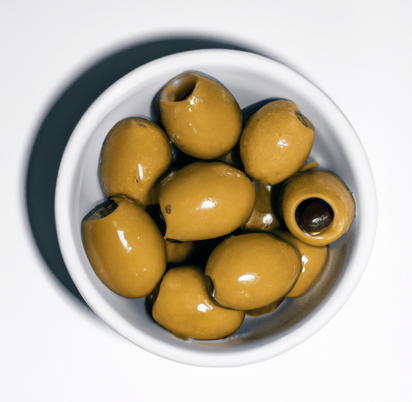Olives: Important Facts, Health Benefits, and Recipes


Explore the world of olives with our ultimate guide, covering health benefits, history, storage tips, and culinary uses of this flavorful and nutritious ingredient.
What Are Olives?
Olives are small, oval-shaped fruits that grow on the Olea europaea tree, native to the Mediterranean region. They have a unique, slightly bitter taste and are commonly used in various dishes, salads, and appetizers. They can be eaten whole or used to make olive oil, which is an essential component of the Mediterranean diet.
Are Olives Healthy?
Absolutely, Olives are extremely healthy! Olives are packed with essential nutrients, including vitamins, minerals, and healthy fats. They are particularly rich in monounsaturated fats, which are known to promote heart health and reduce inflammation. Plus, they contain powerful antioxidants that protect the body from oxidative damage and help maintain overall health.
8 Health Benefits of Olives
- Promote heart health: Olives contain heart-healthy monounsaturated fats and antioxidants that help lower bad cholesterol and reduce the risk of heart disease.
- Support weight management: The healthy fats in olives help regulate appetite and reduce cravings, making them a great addition to a balanced diet for weight management.
- Boost immune function: Rich in antioxidants and essential nutrients, olives support a strong immune system and help the body fight off infections.
- Improve digestion: Olives are a good source of dietary fiber, which promotes healthy digestion and prevents constipation.
- Enhance skin health: The antioxidants and healthy fats in olives nourish and protect the skin, helping to maintain a youthful appearance.
- Support bone health: Olives contain essential nutrients like calcium, phosphorus, and vitamin K, which contribute to strong and healthy bones.
- Reduce inflammation: The anti-inflammatory properties of olives help alleviate symptoms of chronic inflammatory conditions, such as arthritis.
- Protect against cancer: The antioxidants in olives have been shown to reduce the risk of certain types of cancer, including breast and colon cancer.
History and Background of Olives
Olives have been cultivated for thousands of years, with evidence suggesting their use as far back as 6000 BCE. They have played a significant role in the culinary and cultural traditions of the Mediterranean region, particularly in Greece, Italy, and Spain. The olive tree is also a symbol of peace and prosperity in many ancient civilizations.
What is the Best Way to Store Olives?
To preserve the freshness and quality of olives, store them in a cool, dark place, such as a pantry or cupboard. If you have opened a jar or can of olives, transfer the remaining olives and their brine to an airtight container and refrigerate. Consume them within two weeks for optimal taste and quality.
What are the Different Types of Olives?
There are hundreds of olive varieties, but some of the most popular ones include:
- Kalamata: A dark purple Greek olive with a rich, fruity flavor
- Manzanilla: A green Spanish olive with a mild, slightly salty taste
- Castelvetrano: A bright green Italian olive with a buttery, mild flavor
- Niçoise: A small, black French olive with a tangy, slightly bitter taste
What is the Best Substitute for Olives if I Don't Have Any?
If you don't have olives on hand, capers can be a suitable substitute, especially in recipes that call for a salty, briny flavor. Alternatively, you can use pickles or sun-dried tomatoes for a similar tangy taste and texture.
What Cuisines Use Olives?
Olives are a staple ingredient in many cuisines, including:
- Mediterranean
- Middle Eastern
- Spanish
- Italian
- Greek
How Are Olives Made?
Olives are typically harvested by hand or using specialized tools, then washed and sorted. They are then cured using various methods, such as brining, dry curing, or lye treatment, to remove bitterness and enhance their flavor. Finally, they are packed in brine, oil, or vinegar to preserve their freshness and taste.
What Are Olives Good For?
Olives are incredibly versatile and can be used in a wide range of dishes, such as salads, pastas, pizzas, and tapenade. They also make a delicious and healthy snack on their own or paired with cheese, crackers, and other appetizers.
Why Are Olives Salty?
Olives are naturally bitter due to the presence of a compound called oleuropein. To remove this bitterness and make them more palatable, olives are cured in a saltwater brine, which also imparts a salty flavor.
Are Olives High In Sodium?
Yes, olives are generally high in sodium. The exact sodium content can vary depending on the type and preparation of the olives. However, in general, olives are salted and cured during processing, which increases their sodium content. The sodium levels can be even higher in certain types of olives, such as green olives stuffed with cheese or anchovies.
It's important to note that the sodium content of olives can vary among different brands and varieties, so it's always a good idea to check the nutrition label for specific information. If you are following a low-sodium diet or have specific dietary restrictions, it may be advisable to moderate your consumption of olives or look for low-sodium alternatives.


:max_bytes(150000):strip_icc()/Greekolives-GettyImages-87114126-598b34640d327a0011750e06.jpg)